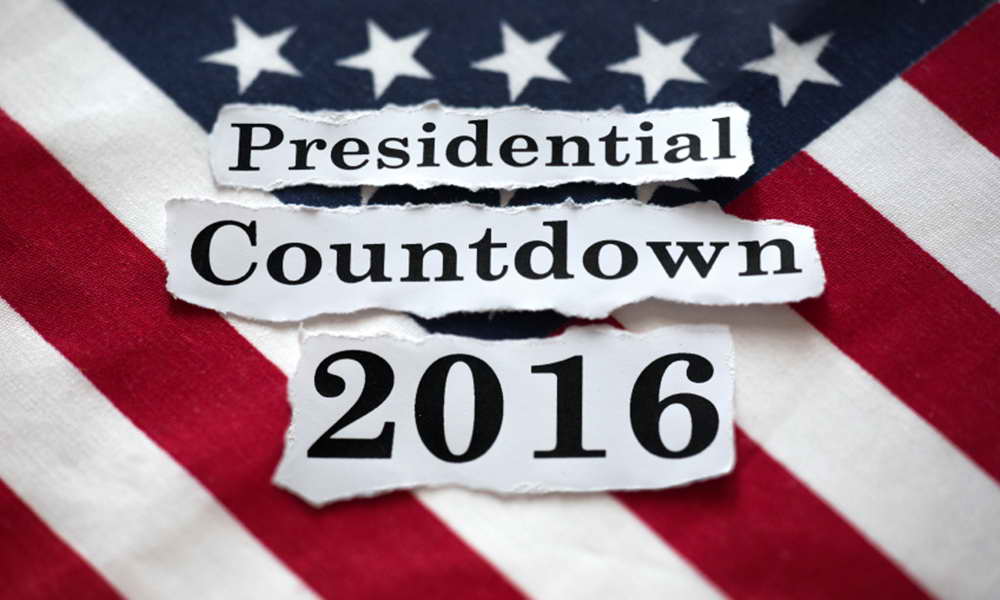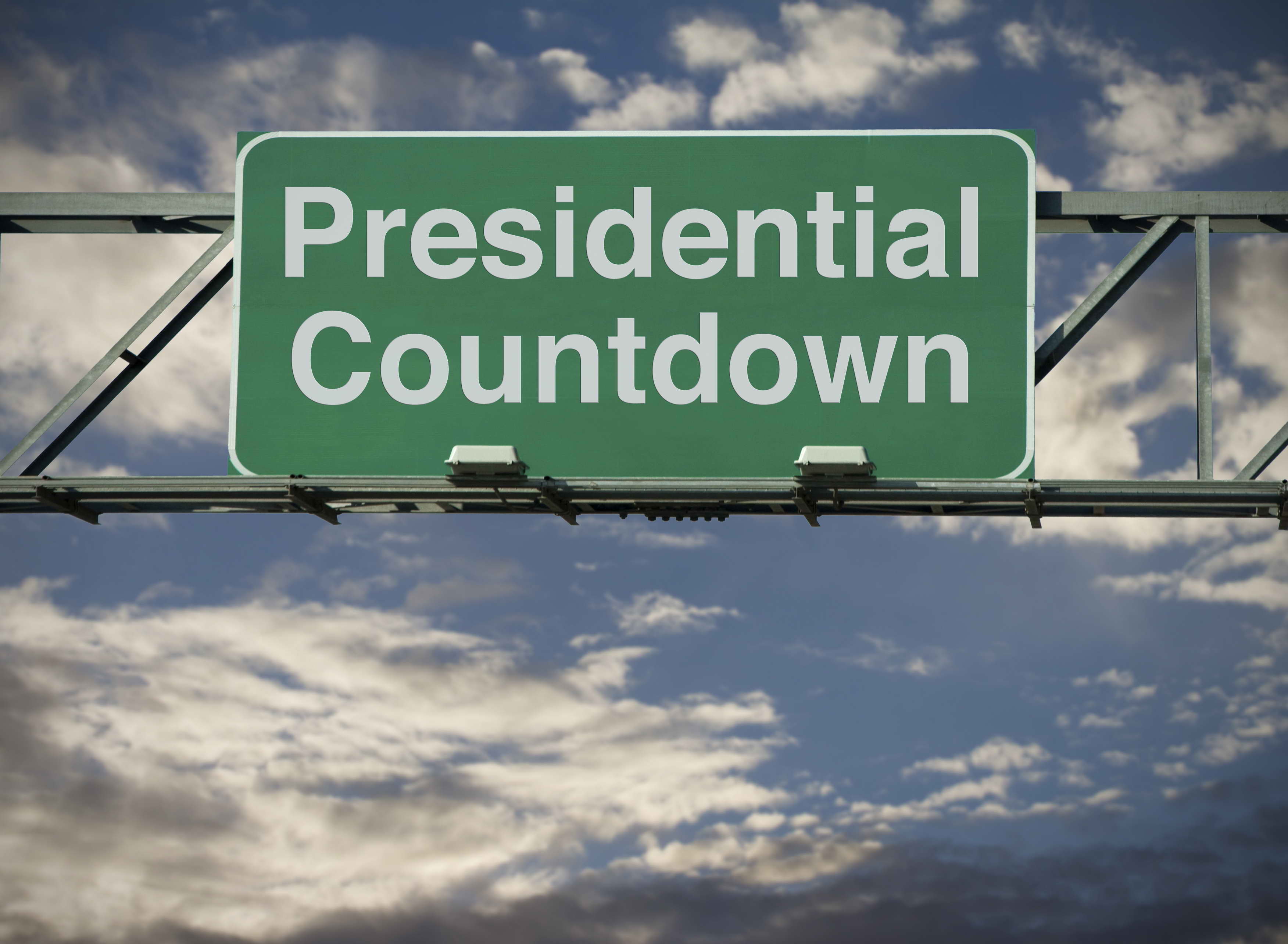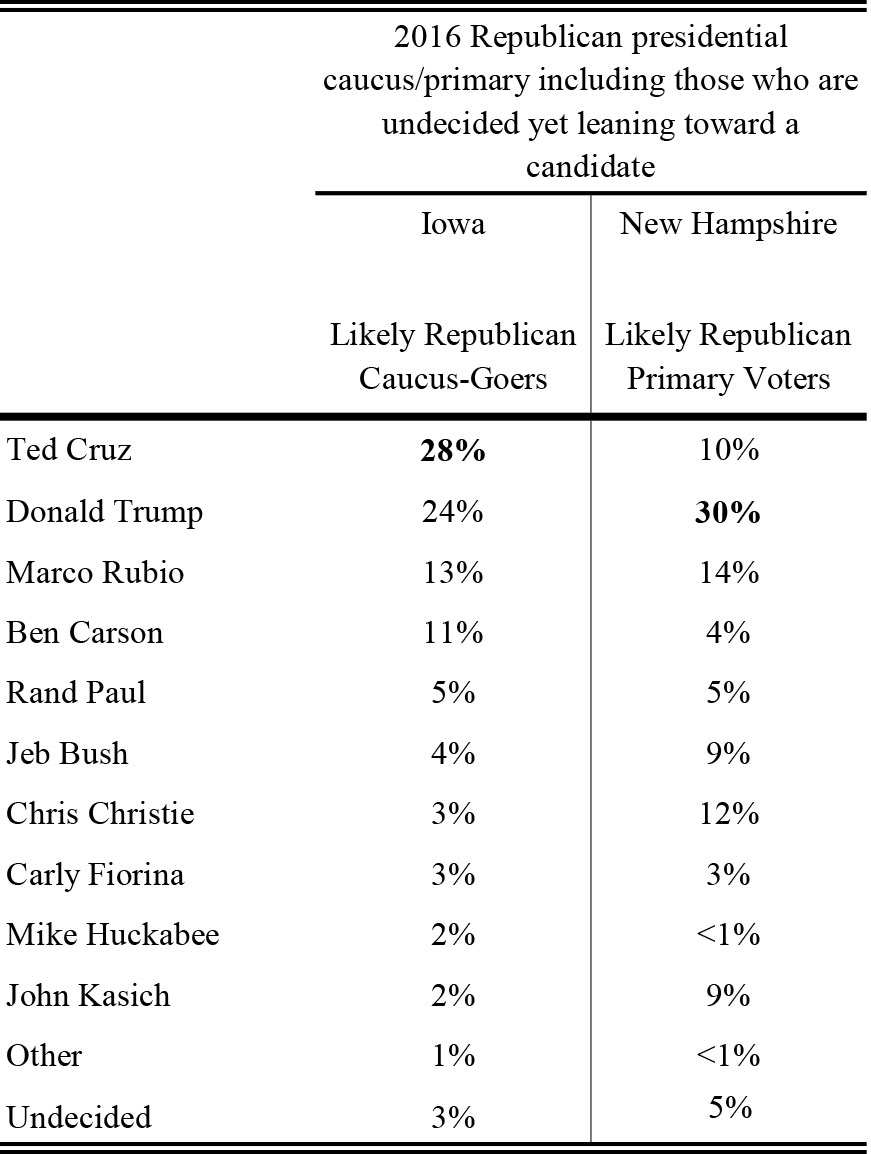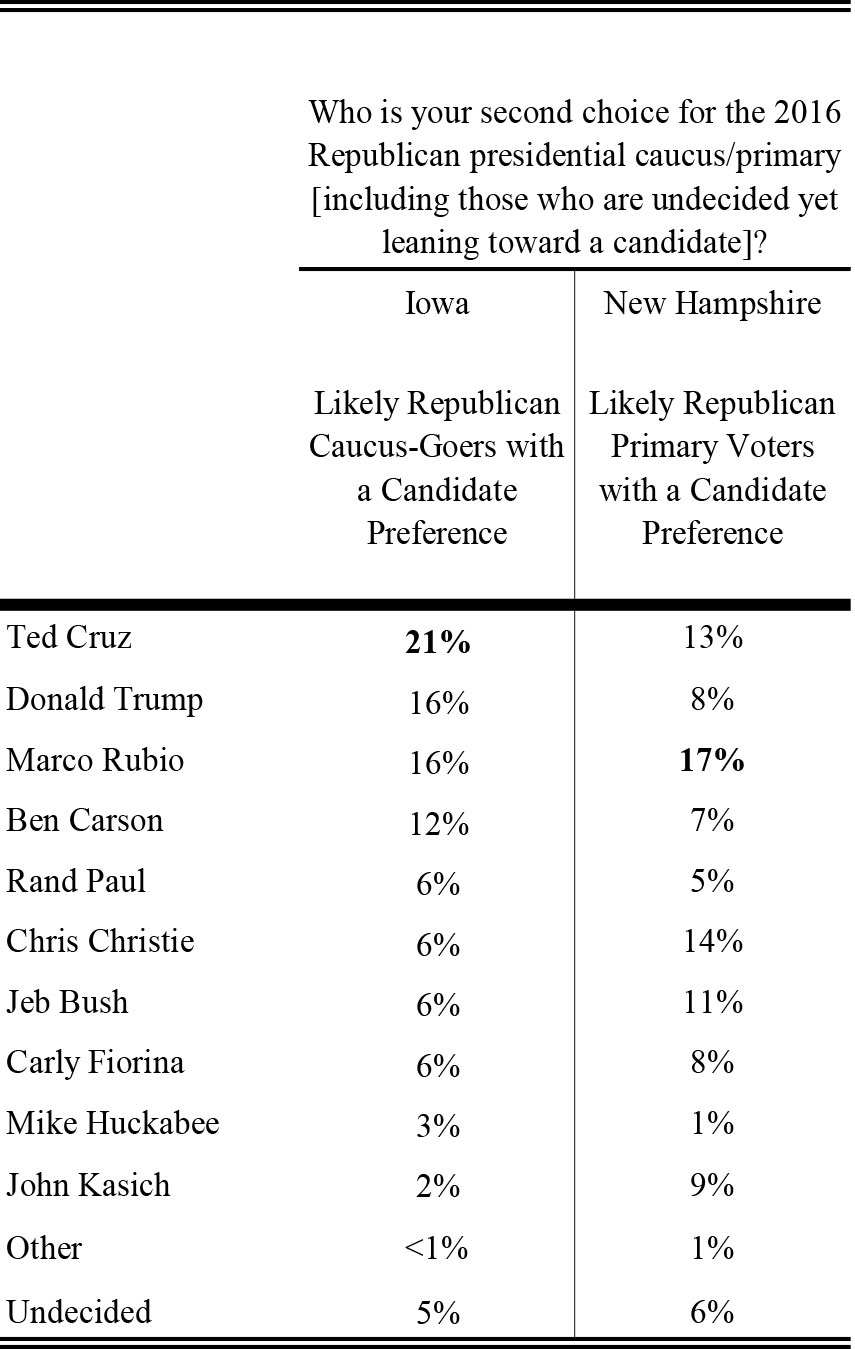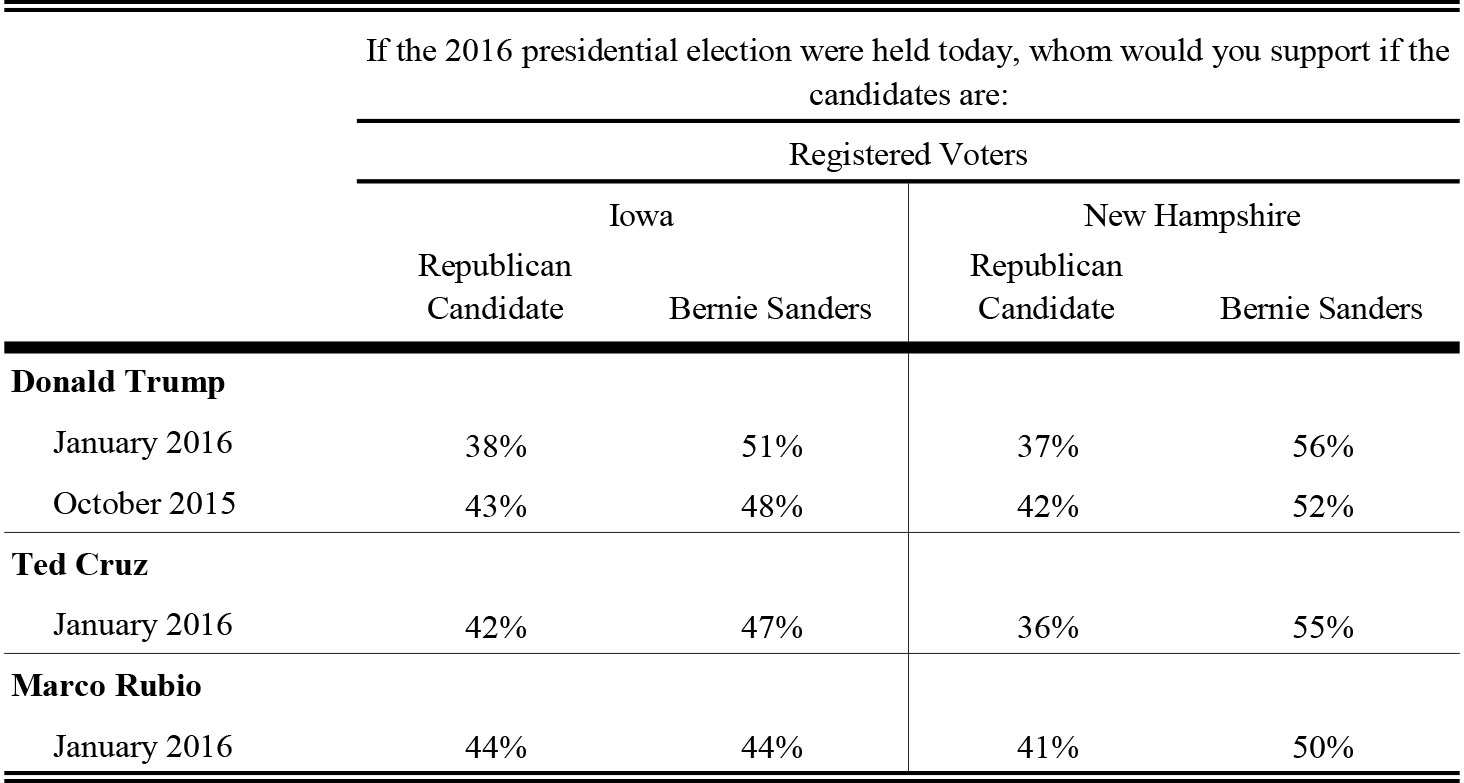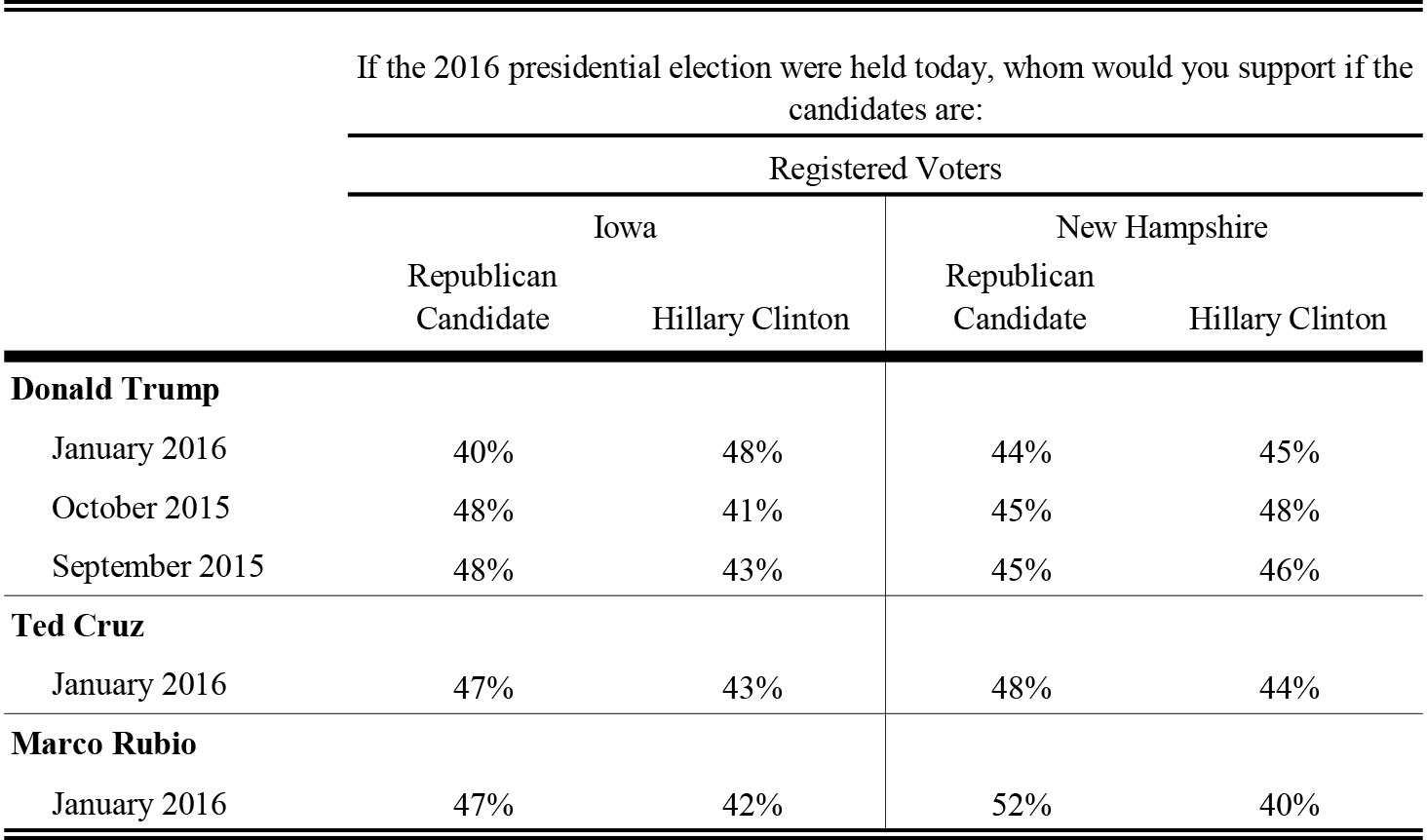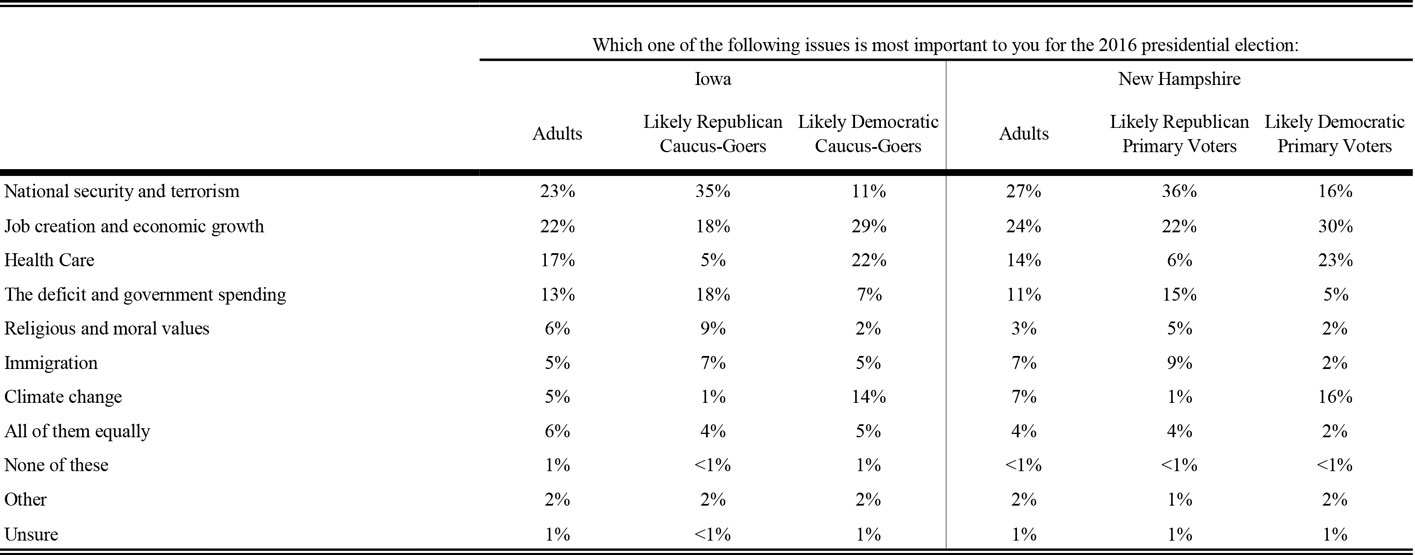January 10, 2016
1/10: Cruz and Trump Vie in IA, Trump NH Favorite… Clinton and Sanders Competitive
With just weeks to go until the Iowa caucus and New Hampshire primary, Texas Senator Ted Cruz, 28%, edges businessman Donald Trump, 24%, among likely Republican caucus-goers in Iowa including those who are undecided yet leaning toward a candidate. Florida Senator Marco Rubio, 13%, and retired neurosurgeon Ben Carson, 11%, are vying for the “third ticket” out of Iowa.
In New Hampshire, Trump, 30%, outdistances Rubio, 14%, and New Jersey Governor Chris Christie, 12%, among likely Republican primary voters statewide including those who are undecided yet leaning toward a candidate. Texas Senator Ted Cruz, 10%, Ohio Governor John Kasich, 9%, and former Florida Governor Jeb Bush, 9%, follow.
Cruz does better among likely GOP caucus-goers in Iowa who support the Tea Party, identify as conservative, are white Evangelical Christians, are men, or college graduates. Trump is ahead among those who do not practice a religion, those who are unmarried, and moderates.
In New Hampshire, Trump leads his Republican rivals among all key demographic groups. He does especially well among likely GOP voters who are college educated, those who do not practice a religion, Tea Party supporters, or conservatives.
Looking at intensity of support, nearly six in ten Iowa likely Republican caucus-goers with a candidate preference, 59%, report they are strongly committed to their choice of candidate. A similar proportion of likely Republican primary voters with a candidate preference in New Hampshire, 55%, also express a high level of support for their candidate of choice.
Cruz, 21%, is the preferred second choice candidate among likely Republican caucus-goers with a candidate preference in Iowa followed by Trump and Rubio each with 16%. Among likely Republican primary voters in New Hampshire with a candidate preference, Rubio, with 17%, is the preferred second choice candidate. Christie comes next with 14% followed by Cruz with 13%.
“Trump and Cruz are battling for the insurgent lane in Iowa, and likely GOP caucus-goers divide over who will get the third ticket out of the Hawkeye State,” says Dr. Lee M. Miringoff, Director of The Marist College Institute for Public Opinion. “In New Hampshire, the big question is whether anyone will emerge to unite the GOP establishment and overtake Trump.”
On the Democratic side, former Secretary of State Hillary Clinton and Vermont Senator Bernie Sanders are competitive among likely Democratic caucus-goers in Iowa and among New Hampshire likely Democratic primary voters including those who are undecided yet leaning toward a candidate. In Iowa, Clinton has 48% to 45% for Sanders. In New Hampshire, Sanders is backed by 50% compared with 46% for Clinton.
Among likely Democratic caucus-goers in Iowa, Clinton has a 15 point lead among Democrats while Sanders has a 33 point margin among independents. Clinton has a wide lead over Sanders among likely Democratic caucus-goers who are 45 or older. Sanders has a more than two-to-one lead over Clinton among those under 45 who plan to caucus. A gender gap exists. Clinton lags behind with 39% among men but receives majority support, 56%, among women.
In New Hampshire, Sanders outpaces Clinton by more than two-to-one among likely Democratic primary voters who identify as independent. Clinton leads by a wide margin, 18 points, among likely voters who are Democrats. A gender divide exists. Clinton narrowly leads Sanders by 4 points among women likely to vote in the Democratic primary. Among men, Sanders has a 16 point advantage over Clinton. He also outdistances Clinton by 33 points among voters under 45 whereas Clinton surpasses Sanders by 9 points among voters who are older.
Looking at intensity of support, in Iowa, 71% of likely Democratic caucus-goers with a candidate preference are strongly committed to their choice of candidate. 76% of likely Democratic primary voters with a candidate preference in New Hampshire express a similar level of support for their selection.
“The Democratic contests in Iowa and New Hampshire could still go either way,” says Dr. Lee M. Miringoff, Director of The Marist College Institute for Public Opinion. “So, if your New Year’s resolution was to have clarity in 2016, you better also have resolved to be patient.”
Turning to the general election, when Clinton and Sanders are each matched against, Trump, Cruz, or Rubio, Sanders does better than Clinton among registered voters in both Iowa and New Hampshire. In Iowa, Sanders achieves his largest lead, 13 points, against Trump and is ahead of Cruz by 5 points among the statewide electorate. Sanders and Rubio are tied among registered voters in Iowa. Sanders leads Trump and Cruz by 19 points in New Hampshire and has a 9 point lead over Rubio in the state.
Looking at Clinton’s general election prospects, she does best against Trump. Clinton leads Trump by 8 points in Iowa, but she is in a statistical dead heat with him in New Hampshire. In both Iowa and New Hampshire, Clinton trails Cruz and Rubio. Her largest deficit is against Rubio in New Hampshire. Rubio leads Clinton by 12 points among registered voters statewide.
When it comes to the issue driving the 2016 presidential election, Iowa likely Republican caucus-goers, 35%, and New Hampshire likely Republican primary voters, 36%, consider national security and terrorism to be critical. However, Iowa likely Democratic caucus-goers, 29%, and New Hampshire likely Democratic primary voters, 30%, say job creation and economic growth is the most pressing topic.
Partisan differences are also reflected in attitudes about many of the hot-button issues facing the United States. Iowa likely Republican caucus-goers support free trade with foreign countries, sending combat troops to fight ISIS in Iraq and Syria, and banning Muslims from entering the United States. They oppose tightening restrictions on the sale of guns, taking action against climate change, and same-sex marriage. They divide about creating immigration policies which include a pathway to citizenship for undocumented immigrants. In New Hampshire, likely GOP primary voters are also more likely to support free trade and sending U.S. combat troops to fight ISIS. However, they support same-sex marriage. Likely Republican primary voters in New Hampshire oppose banning Muslims from entering the United States, strengthening restrictions on the sale of firearms, immigration policies which include a pathway to citizenship, and combating climate change.
The likely Democratic electorates in both Iowa and New Hampshire support same-sex marriage, taking action to combat climate change, strengthening laws covering the sale of firearms, immigration policies which include a pathway to citizenship for undocumented or illegal immigrants, and free trade with foreign countries. They oppose banning Muslims from entering the United States and sending troops to fight ISIS in Syria and Iraq.
President Barack Obama’s job approval rating continues to be upside down among residents in Iowa and New Hampshire. 51% of Iowa residents disapprove of President Obama’s job performance, and 40% approve. In New Hampshire, 50% of adults disapprove of how the president is doing his job, and 42% approve. President Obama’s approval ratings in Iowa and New Hampshire reflect those reported previously in October’s NBC News/Wall Street Journal/Marist Poll.
Complete January 10, 2016 NBC News/WSJ/Marist Poll Release of Iowa and New Hampshire
Complete January 10, 2016 NBC News/WSJ/Marist Poll Tables of Iowa (Adults & Registered Voters)
Complete January 10, 2016 NBC News/WSJ/Marist Poll Tables of Iowa (Likely Republican Caucus-Goers)
Complete January 10, 2016 NBC News/WSJ/Marist Poll Tables of Iowa (Likely Democratic Caucus-Goers)
Marist Poll Methodology for Iowa

